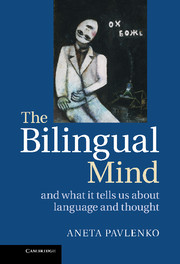Book contents
- Frontmatter
- Contents
- List of Tables
- Acknowledgments
- Preface
- 1 The Sapir-Whorf hypothesis and the bilingual turn in the study of language and cognition
- 2 Material worlds
- 3 Multidimensional worlds
- 4 Dynamic worlds
- 5 Narrative worlds
- 6 Discursive worlds
- 7 Emotional worlds
- 8 The bilingual mind and what it tells us about language and cognition
- References
- Author index
- Subject index
6 - Discursive worlds
Inner speech, interpretive frames, and the accomplishment of intersubjectivity
Published online by Cambridge University Press: 05 June 2014
- Frontmatter
- Contents
- List of Tables
- Acknowledgments
- Preface
- 1 The Sapir-Whorf hypothesis and the bilingual turn in the study of language and cognition
- 2 Material worlds
- 3 Multidimensional worlds
- 4 Dynamic worlds
- 5 Narrative worlds
- 6 Discursive worlds
- 7 Emotional worlds
- 8 The bilingual mind and what it tells us about language and cognition
- References
- Author index
- Subject index
Summary
The true locus of culture is in the interactions of specific individuals and, on the subjective side, in the world of meanings which each one of these individuals may unconsciously abstract for himself from his participation in these interactions. … the degree to which the socialized behavior of any given individual can be identified with or abstracted from the typical or generalized culture of a single group varies enormously from person to person.
Sapir, 1949: 515In the mid 1990s, I was a graduate student in linguistics at Cornell University, working on my dissertation. Inspired by Bartlett’s ([1932] 1995), Worth and Adair’s ([1972] 1997) and Chafe’s (1980) research, I wanted to make my own films to see whether the process of learning a new language may lead L2 learners to ‘see’ things that monolingual speakers of their L1 do not. What I did not know was what those ‘things’ should be. And then I came across an essay on bilingualism, dialogism, and schizophrenia by a French scholar, Tzvetan Todorov (1985, 1994). The essay described an unusual experience Todorov had in translating a conference paper from his L2 French into the L1 Bulgarian – he suddenly found himself changing the argument into its opposite. The essay both puzzled and intrigued me – if only I could capture something like that! And then I caught a lucky break – Todorov came to Cornell to give a talk and kindly agreed to be interviewed. In what follows, I will use this unpublished interview (Todorov, 1997) and Todorov’s (1985, 1994, 1996, 2008) autobiographical writings to guide further inquiry into linguistic thought and the relationship between bilingualism and cognition.
- Type
- Chapter
- Information
- The Bilingual MindAnd What it Tells Us about Language and Thought, pp. 206 - 244Publisher: Cambridge University PressPrint publication year: 2014



